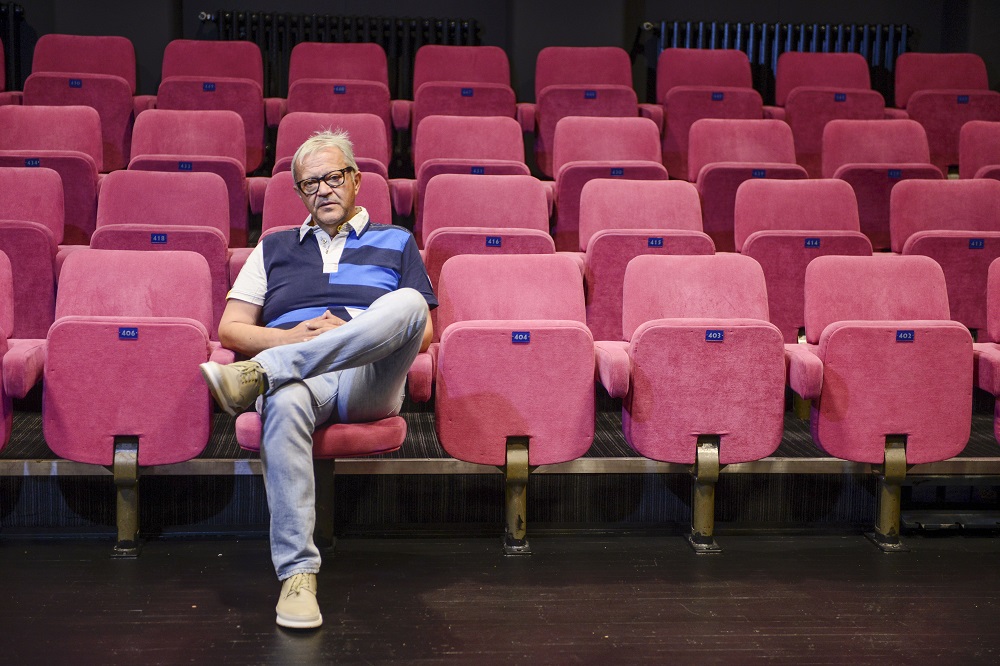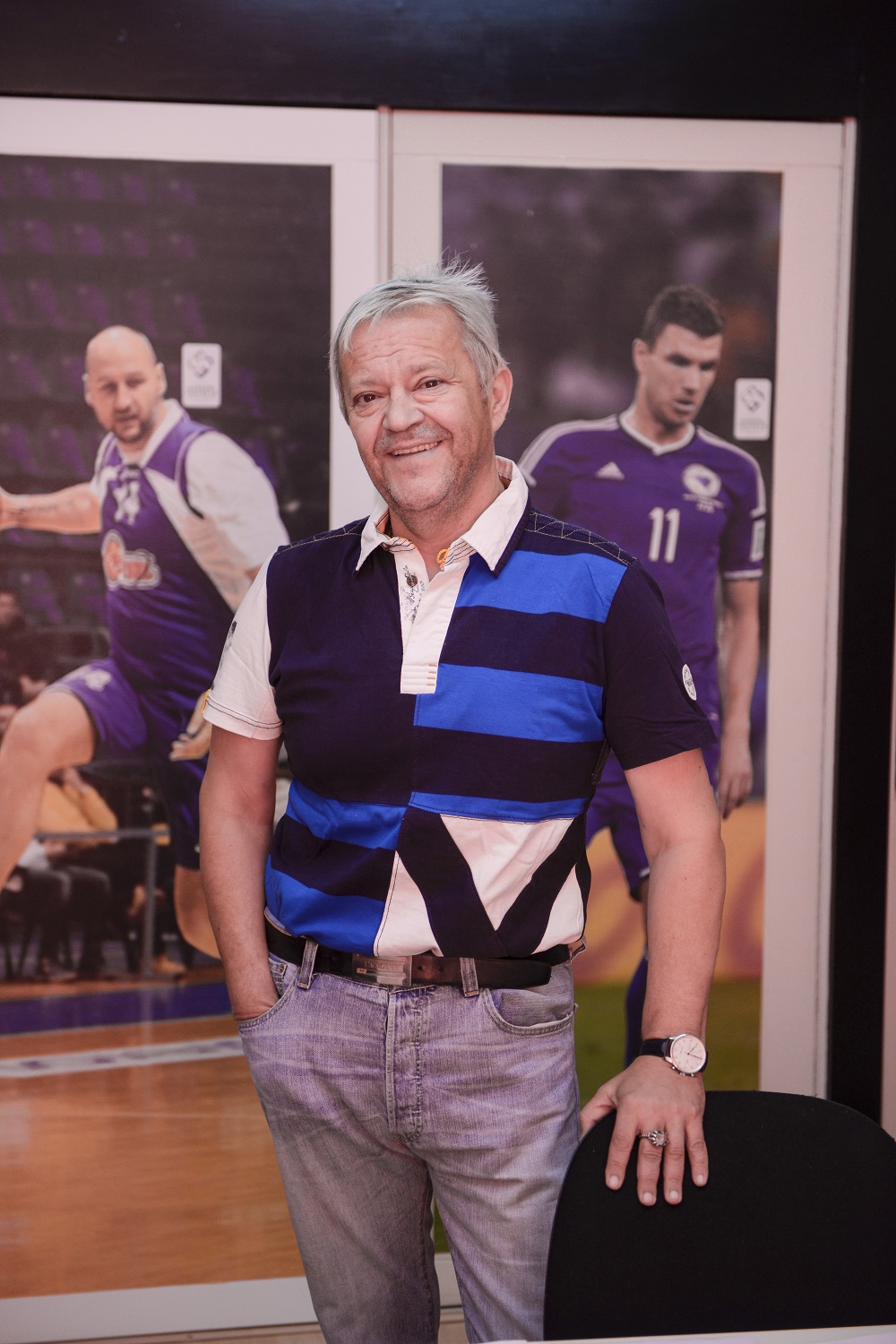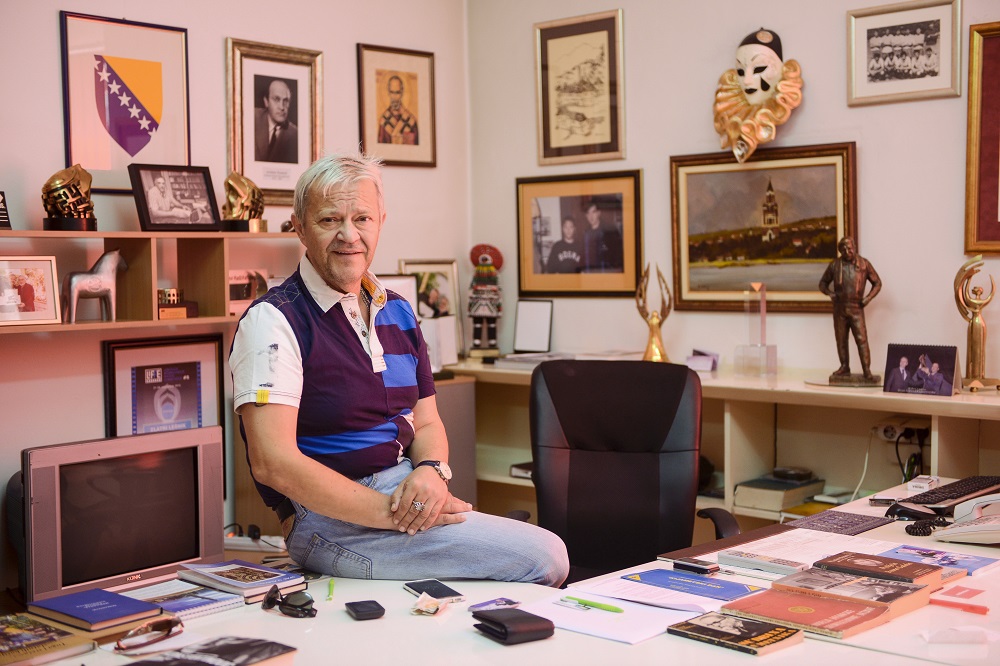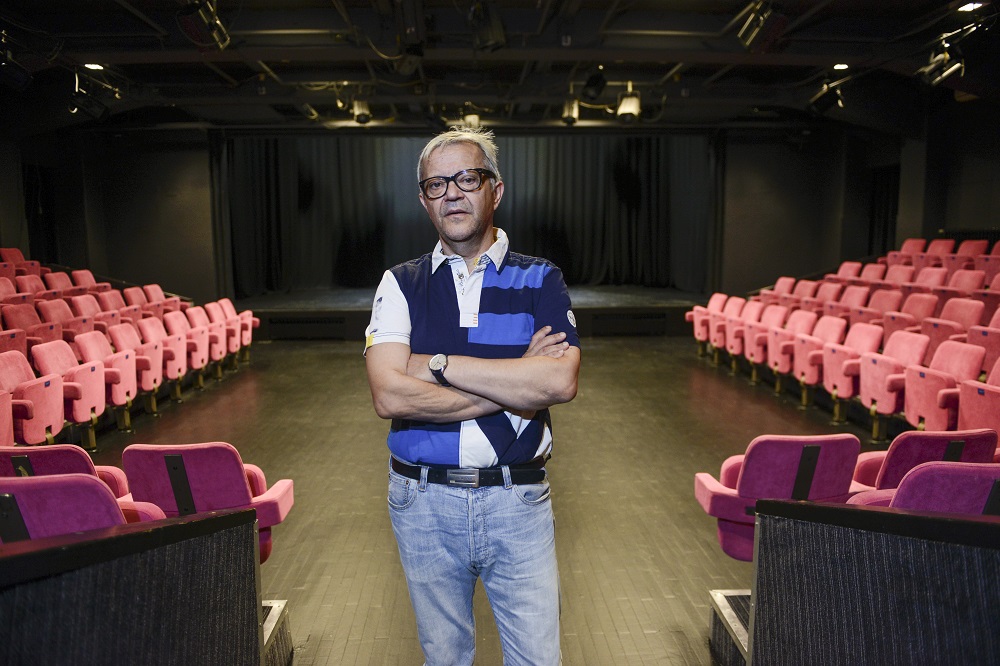An award-winning actor, he’s worked with the best, often turning down lead roles and choosing those that would be a one-day shoot, as for him there are no big or small, but rather good or bad roles. Audiences don’t forget what they love, and this is best reflected with the revival of cult show Audition, as well as the film adaptation of drama Žaba (Frog)

Interviewed by: Elma Zećo
Photo: Irfan Redžović
The play Frog has been performed for almost ten years based on the dramatic text by Dubravko Mihanović, dedicated to the modern age of lack of understanding, loneliness, and search of love and purpose. Audiences across all meridians have seen it, while it has been played on the stage of Chamber Theatre 55, where this interview was conducted, 250 times. Such a strong story had to be immortalised. However, apart from the story, what remained on the screen are the feelings and recognition of Emir Hadžihafizbegović that it was precisely the role of Zeko (Rabbit) which he embodies, that completed him as an actor. After the premiere of Frog at the Sarajevo Film Festival, the audience now awaits the start of cinema distribution.
Acting and private legacy
Why did the role of Zeko leave such a deep mark on your heart?
– I see it as my most significant role, even though I have been in 61 feature films. In our work, it is rare for illusion, and both theatre and film are illusion, and the harsh reality, on stage or on camera, to collide. A large part of this drama is something I personally went through during the four-year aggression on BiH. When you play in an ancient tragedy, Othello, a Renaissance comedy, comedy dell’arte…, you show your acting skills and, really, these are hard tasks, but those are epochs, and characters that came about hundreds of years ago, while Zeko from Frog is in some way a huge part of my personal experience. Hence, I’m happy that I left a trace of him on screen as well, that might be my acting and private legacy.
In one moment, the character you play says that it is good for everyone to peek into their soul to see where they make mistakes. Do you personally find self-examination painful?
– That sentence is followed with the words that optimism represents the health of the soul. I grew up in a family where the word misfortune was always replaced by the word trial, when you believe in the Lord of all the Worlds, who sees everything that is happening very well, so that when I went through difficult times in my life, it was a trying experience, rather than tragedy. Of course, the word painful is too strong, but the experience of living in BiH is burdensome. Sidran once wrote that people who think they’ve survived the war live in Sarajevo, but we are not even aware of how much the extremely difficult situation has affected us, despite the fact that the Bosnian-Herzegovinian quickly resets himself/herself. Today, we live in post-war times, 20 years that have been „eaten away“, but I am a man with two grown children, a family which is brought together and directed by the phrase that optimism is the health of the soul. Despite the existential panic, the bad political situation, I strongly believe that there are elements of life to be found that can be good.

Theatre and film are different media. Which do you prefer?
– It’s a big responsibility to go out in front of living people and do acting in that moment, just as it’s a responsibility to act when the camera is buzzing, as what you do in that moment and what the director says is done, it remains as digital recording and there is no more changing. I treat film and theatre equally. Maybe theatre is riskier, as there is no repetition. You can make a mistake on film, but you can also do another take. In the region, I have the reputation of a Broadway professional. The attitude I have towards work is the reason I have done so many films and why I’m in demand in theatre and on film. If you want the epilogue of your work to be great, then you cannot work without the utmost concentration and huge professionalism.
The Last of the Mohicans
You don’t feel the need to be present on social networks. The visible profiles of you on Facebook are fake. How is it possible that it doesn’t appeal to you at all?
– Yes, I have issues with the technological boom. Sometimes I see the internet as a bathroom door. Cretins and fools, who didn’t make anything of themselves in their own four walls, got their five minutes of fame, and now they have the opportunity to – without any identity check – be followed by the entire world. On one hand, social networks are good and it’s good that you can reach an American library and find Thomas Jefferson’s speech for your doctorate, while, on the other hand, the internet shows the multiplying of paedophiles, as well as the comments of unfulfilled, insecure people who are anonymous. In that context, I have a problem with the technological boom, because it’s the zombies, idiots, paedophiles that use it to a large extent… It’s like enriched uranium, you can heal cancer with it, but you can also make an atom bomb out of it. It’s just a question of where it will all lead. I am the last of the Mohicans, I don’t use social networks, although my children and serious film agents are trying to talk me into it.

You called yourself an endemic Bosnian who couldn’t settle down until he found himself a corner in Herzegovina. What have you found in our south?
– I have this small oasis, a nest where I galvanise, as Ćiro Blažević would say. In Željuša, near Mostar, about ten years ago I made a place of rest along the Neretva, one of our prettiest rivers. When I cross Ivan, when the Mediterranean wind hits me, I feel better mentally. The humidity and drabness disappear. That certainly doesn’t mean that I don’t love Sarajevo, it’s also high up on my list with plenty of positive attributes, but Herzegovina is special and Herzegovinians have no idea of where they were born, as they have a naturally healthy environment. In general, we tend to think that things happen automatically. Growing up in beautiful BiH, we think that’s how it should be. But, foreign guests who have seen the heavenly regions of Bosnian-Herzegovinian geography have more of a comparative appreciation of what it means to live in our country, than we do. I waited for a long time to find a piece of land in Herzegovina. I feel great there, I have a boat, a local and Japanese apple tree, cherries, a plum tree, olives, and I plan to plant kiwi as well. It’s a place where I try to get away from a dehumanising world.
Robert de Niro told you that the best acting years are between the ages of 55 and 70. What could intrigue you in the future?
– A long time ago I said that I’d like to play Caligula in theatre. I read Albert Camus’ work over 30 years ago, but it comes back to me every three, four years. Also, Messrs. Glembay, something of Nušić’s, who is underrepresented in this region, Nedžad Ibrišimović, and I’d love it if Sidran wrote something for theatre again. Film is more about supply and demand. Currently, I have four or five screenplays in my office, I might give them all a miss, or take on one or two. After a world of experience, I have a desire to direct a film myself. There’s a topic I’m interested in, but we’ll discuss that in the future.
Relaxation with sport
As a young man, he wanted to be a sports journalist, to travel, but as fate would have it he became an actor. However, today sport is still his big passion. He enjoys playing mini football, and generally following „the most important secondary thing in the world“, as well as basketball. “My favourite football clubs are Sloboda from Tuzla, and Barcelona. I go to El Clasico, of course, only to Barcelona. I wouldn’t go to Madrid even if everything was payed for and they put me up in the best hotel. I also follow Liverpool, and when it comes to local clubs I love Željo, and Sarajevo, and Velež, and Čelik, actually all B&H clubs, while Hajduk is my favourite club from the former Yugoslavia region.”
Theatre leads to triumph
Emir Hadžihafizbegović has been linked to Chamber Theatre 55 for 18 years, playing close to 600 shows on its stage, so despite having no ambition to become the director, his colleagues talked him into taking on the great commitment. “It has worsened my diabetes, but sometimes you have to make sacrifices for a good and noble cause, which must not fail. Chamber Theatre 55 is one of the most important theatres in the region, with a rich history, rich repertoire, world appearances, so I don’t mind that I made that decision. Since its existence, theatre has been dealing with problems and „fixing“ people. When it deals with a problem, it’s already a success; when it fixes people, then it’s a triumph.”

Days of Jurislav Korenić
The second annual festival Days of Jurislav Korenić, the cultural worker known as the „foundation of theatre“ in Sarajevo, will be held from December 14 to 21, 2017. The aim is to place this magical figure, which has been forgotten and pushed to the margins, back to its rightful position. “I belong to the category of people who nurtures a culture of remembrance, as those who have no culture of remembrance, have no culture of living. We already have shows arranged from Serbia, Montenegro, Croatia and BiH. We are still in search of the best shows from Slovenia, Macedonia, and, eventually, Kosovo. I thank the Ministry of Culture and Sports of Canton Sarajevo for their sensibility, and minister Mirvad Kurić.”




